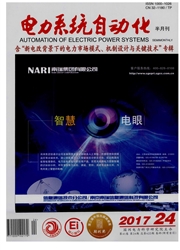

 中文摘要:
中文摘要:
针对由间歇性可再生能源、柴油发电机组(DGS)和蓄电池储能系统构成的独立微网,提出一种提高系统频率稳定性的虚拟同步发电机(VSG)控制策略。首先,建立DGS在同步旋转坐标系下的数学模型并分析其输出电压与频率的阶跃特性;其次,在理论分析VSG控制与微网频率稳定性关系的基础上,将同步发电机的转子运动方程、一次调频特性及无功调压特性引入储能变换器(ESC)的控制中,使ESC具有虚拟惯性与阻尼;然后,利用MATLAB/Simulink仿真软件对比针对ESC采用传统电流控制、下垂控制及VSG控制时负载阶跃条件下的系统频率响应特性;最后,建立一套包含2台VSG及1台DGS并联的独立微网实验平台,实验结果验证了所述控制策略的正确性与有效性。
 英文摘要:
英文摘要:
A frequency stability control strategy for an islanded microgrid including intermittent renewable energy,diesel generator set(DGS)and battery energy storage system is proposed based on a virtual synchronous generator(VSG).First,a DGS equivalent mathematical model is built to illustrate the step response characteristics of the DGS output voltage and rotating speed in a synchronous rotating coordinate reference frame.Besides,on the basis of theoretical analysis of VSG control and frequency stability of the microgrid,the control approach to an energy storage converter with virtual inertia and virtual damping is designed using the rotor motion equation of the synchronous generator,the primary frequency regulation feature and the voltage reactive power regulation characteristic.Furthermore,the frequency response characteristics of the microgrid are compared with those of conventional current control,droop control and VSG control for the energy storage converter(ESC)based on the MATLAB/Simulink under fluctuations by loads.Finally,the proposed strategy is demonstrated in detail and validated with an islanded microgrid consisting of two VSGs and a DGS under various conditions.
 同期刊论文项目
同期刊论文项目
 同项目期刊论文
同项目期刊论文
 期刊信息
期刊信息
